Choosing residential solar batteries for energy storage offers you numerous benefits. You'll gain energy independence, reduce reliance on the grid, and have backup power during outages. These systems maximize your solar investment by storing excess energy for later use, leading to lower electricity bills. Solar batteries support grid stability, reduce your environmental impact, and integrate seamlessly with smart home technology. They're scalable to meet your future energy needs and often come with financial incentives. By opting for solar batteries, you're investing in a cleaner, more resilient energy future. Exploring the details will reveal even more advantages to this powerful technology.
Energy Independence and Self-Sufficiency
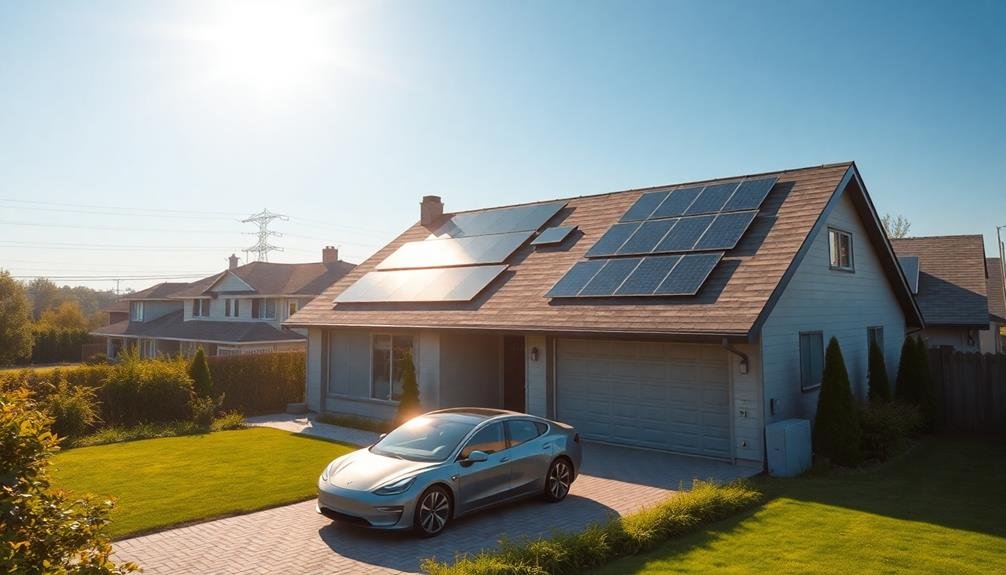
In recent years, residential solar batteries have emerged as a game-changer for homeowners seeking energy independence. By storing excess energy generated by your solar panels, these batteries allow you to reduce your reliance on the grid and take control of your power supply. You'll no longer be at the mercy of utility companies or vulnerable to power outages.
With a solar battery system, you can use your own stored energy during peak hours when electricity rates are highest, saving money on your utility bills. You'll also have a backup power source during blackouts, ensuring your essential appliances and devices remain operational. This self-sufficiency is particularly valuable in areas prone to natural disasters or unreliable grid infrastructure.
Moreover, solar batteries enable you to maximize your solar investment by utilizing more of the energy your panels produce. Instead of sending excess power back to the grid, you can store it for later use, increasing your overall energy independence.
As battery technology continues to improve and costs decrease, residential solar batteries are becoming an increasingly attractive option for homeowners looking to embrace sustainable, self-reliant energy solutions.
Emergency Power During Outages
During power outages, residential solar batteries shine as a reliable emergency power source. You'll have peace of mind knowing that your essential appliances and devices can keep running when the grid fails. Unlike fossil fuel generators, solar batteries operate silently and don't emit harmful fumes, making them safer for indoor use.
Your solar battery system can be programmed to automatically kick in when an outage occurs, ensuring a seamless shift to backup power. You can prioritize which circuits and appliances receive power, focusing on critical needs like refrigeration, medical equipment, and communication devices.
Here's a quick comparison of emergency power options:
| Feature | Solar Batteries | Gas Generators | Portable Power Stations |
|---|---|---|---|
| Fuel Source | Sun (renewable) | Gasoline/Propane | Electricity (pre-charged) |
| Noise Level | Silent | Loud | Silent |
| Maintenance | Low | High | Low |
Maximizing Solar Energy Usage
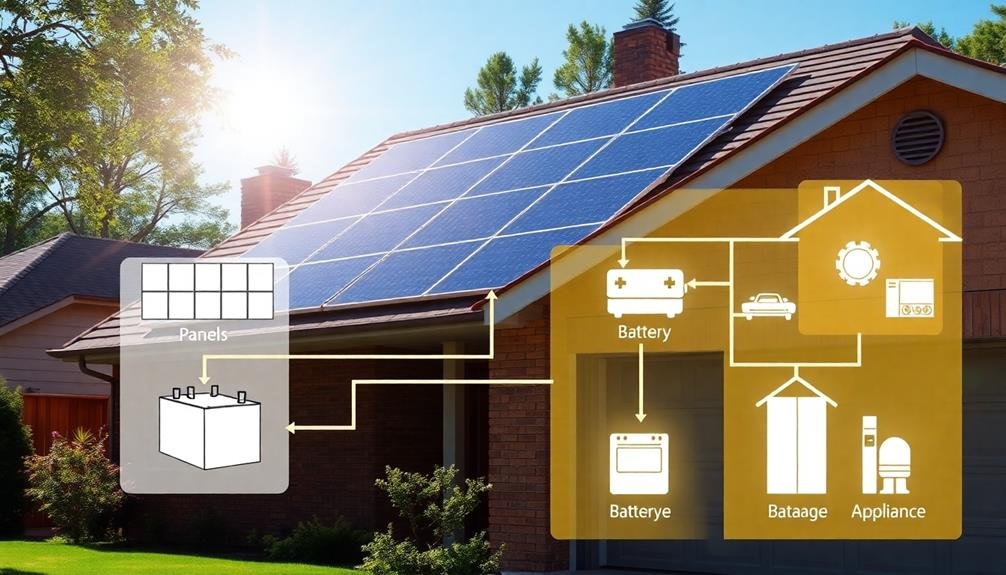
Solar batteries release the full potential of your home's renewable energy system. They allow you to store excess energy generated during peak sunlight hours for use when your panels aren't producing, typically at night or on cloudy days. This means you're able to utilize more of the clean energy you produce, reducing your reliance on the grid and potentially lowering your electricity bills.
With a battery system, you can optimize your solar energy usage by timing your consumption. You'll be able to run high-energy appliances during off-peak hours using stored power, avoiding costly time-of-use rates from your utility company. Some smart battery systems even learn your energy patterns and automatically adjust to maximize efficiency.
Additionally, solar batteries enable you to take advantage of net metering programs more effectively. Instead of sending excess power back to the grid for minimal credit, you can store it for later use. This is particularly beneficial in areas where utility companies offer less favorable net metering rates.
Reduced Electricity Bills
While the initial investment may seem substantial, residential solar batteries can considerably reduce your electricity bills over time. By storing excess energy generated during peak sunlight hours, you'll be able to use this stored power during periods of low solar production or at night, minimizing your reliance on the grid.
With solar batteries, you can take advantage of time-of-use rates offered by many utility companies. You'll store energy when rates are low and use it during high-rate periods, effectively reducing your overall electricity costs. Additionally, in areas with net metering policies, you can sell excess energy back to the grid, further lowering your bills.
Solar batteries also provide protection against rising electricity prices. As utility rates increase, your savings will grow proportionally. In some cases, you may even achieve complete energy independence, eliminating your electricity bill entirely.
Furthermore, some regions offer incentives and rebates for installing solar storage systems, making the initial investment more affordable and accelerating your return on investment. By reducing your long-term energy costs, residential solar batteries offer a financially savvy solution for homeowners looking to optimize their energy usage and savings.
Grid Stability Support
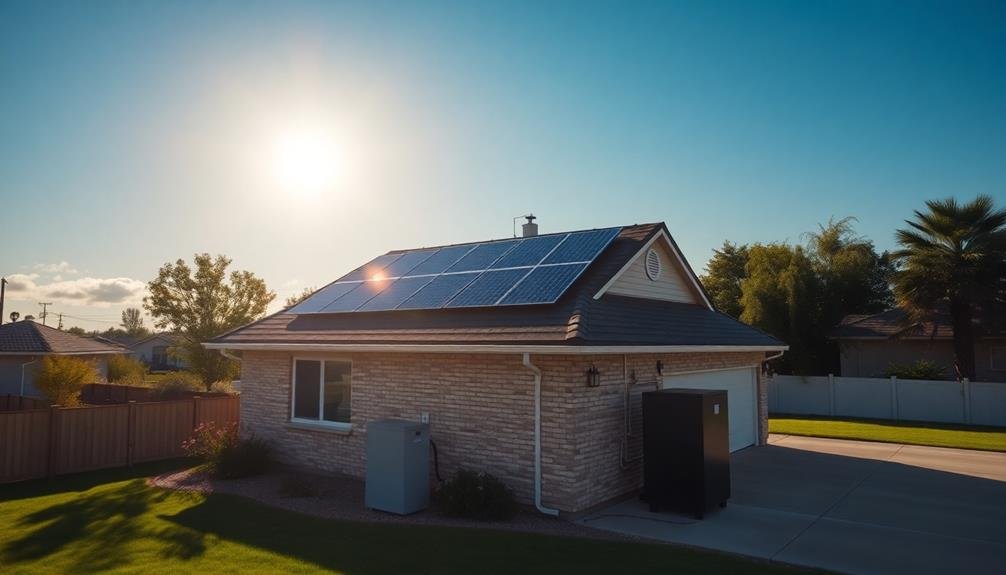
Your residential solar battery can contribute to grid stability in several ways.
You'll support frequency regulation services, helping maintain the balance between electricity supply and demand.
Additionally, your battery's demand response capabilities allow it to reduce strain on the grid during peak hours, while its voltage support provision helps maintain consistent power quality in your neighborhood.
Frequency Regulation Services
As power grids increasingly rely on renewable energy sources, residential solar batteries can play an essential role in providing frequency regulation services. Your home battery system can help maintain the grid's stable frequency of 60 Hz by quickly responding to fluctuations.
When the grid frequency drops, your battery can instantly discharge power, and when it rises, it can absorb excess energy.
By participating in frequency regulation, you're not only supporting grid stability but also potentially earning additional income. Many utility companies offer incentives or payments for homeowners who allow their batteries to be used for this purpose.
Your solar battery can automatically respond to signals from the grid operator, adjusting its charge or discharge rate within seconds.
This rapid response capability is vital for maintaining power quality and preventing blackouts. As more intermittent renewable energy sources come online, the need for distributed frequency regulation increases.
Your residential battery can help smooth out these fluctuations, reducing the strain on traditional power plants and enabling a more resilient, flexible grid.
You'll be contributing to a cleaner, more stable energy future while potentially lowering your electricity costs.
Demand Response Capabilities
Residential solar batteries offer three key demand response capabilities that support grid stability.
These capabilities allow you to actively participate in balancing the electrical grid, reducing strain during peak demand periods, and potentially earning incentives from your utility company.
The demand response capabilities of your solar battery system include:
- Peak shaving: Your battery can automatically discharge stored energy during high-demand periods, reducing your reliance on the grid when it's most stressed.
- Load shifting: You can program your battery to charge during off-peak hours and discharge during peak hours, effectively moving your energy consumption to times when grid demand is lower.
- Emergency backup: In case of a grid outage, your battery can seamlessly provide power to your essential appliances, maintaining your comfort and safety while reducing the overall impact on the grid.
Voltage Support Provision
Beyond demand response, residential solar batteries play an essential role in maintaining grid stability through voltage support provision. Your solar battery system can help regulate voltage levels on the local grid, ensuring a steady and reliable power supply for your neighborhood. When the grid experiences voltage fluctuations, your battery can quickly respond by either injecting or absorbing reactive power.
This capability becomes increasingly important as more renewable energy sources are integrated into the grid. Solar and wind power can cause voltage instability due to their intermittent nature, but your battery acts as a buffer, smoothing out these fluctuations. By participating in voltage support, you're contributing to a more resilient and efficient power system.
Your solar battery's inverter is key to this function, as it can adjust its power output in real-time based on grid conditions. This helps prevent issues like voltage sags or swells that can damage electrical equipment.
Additionally, by supporting grid stability, you may be eligible for incentives from your utility company. These programs recognize the value of distributed energy resources like your battery in maintaining overall power quality and reliability.
Environmental Impact Reduction
How can residential solar batteries contribute to reducing our environmental footprint? By storing excess solar energy for later use, these batteries help maximize the efficiency of your renewable energy system. This means you'll rely less on grid electricity, which often comes from fossil fuel sources. As a result, you'll greatly decrease your household's carbon emissions and overall environmental impact.
Solar batteries also support the broader adoption of clean energy by:
- Reducing strain on the power grid during peak hours, potentially decreasing the need for additional fossil fuel power plants
- Enabling greater integration of renewable energy sources into the electrical grid
- Minimizing energy waste by storing surplus solar power that would otherwise be lost
Moreover, using solar batteries can help you become more energy independent, reducing your reliance on centralized power systems.
This shift towards decentralized energy production and storage can lead to a more resilient and sustainable energy infrastructure.
Smart Home Integration
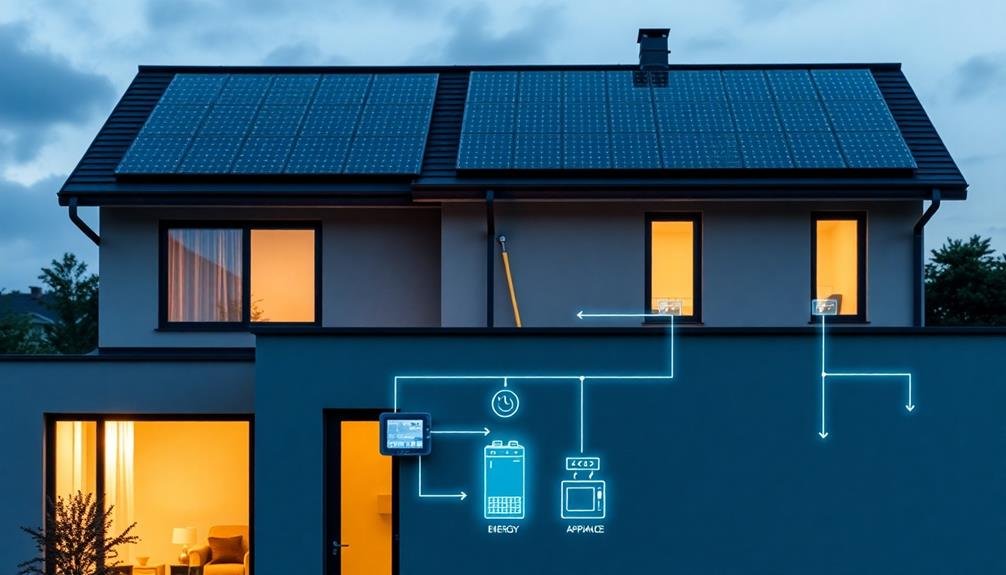
The integration of residential solar batteries with smart home systems takes energy efficiency and convenience to new heights. You can connect your battery to your home's smart energy management system, allowing for seamless control and monitoring of your power usage.
This integration enables you to optimize your energy consumption by automatically prioritizing stored solar power during peak usage hours or when grid electricity is most expensive.
Smart home integration also allows you to remotely manage your battery through smartphone apps or voice-controlled assistants. You'll be able to check battery levels, adjust charging schedules, and even redirect power to specific appliances or areas of your home as needed.
Some systems can learn your energy usage patterns and adapt accordingly, further maximizing efficiency.
Additionally, you can set up automated responses to power outages or grid instability. Your smart home system can instantly switch to battery power, ensuring uninterrupted electricity for critical devices.
This feature is particularly valuable for maintaining home security systems, medical equipment, or home office setups during unexpected power disruptions.
Scalability for Future Needs
When considering residential solar batteries, you'll want to think about your future energy needs.
Modular system expansion allows you to add capacity as your requirements grow, while increased capacity options provide flexibility for larger power demands.
You can also choose batteries with adaptable power requirements, ensuring your system can evolve with changing household energy consumption patterns.
Modular System Expansion
With an eye on the future, modular system expansion offers homeowners the flexibility to scale their residential solar battery setups as energy needs change.
You'll have the ability to start small and grow your system over time, guaranteeing that your investment remains relevant and efficient as your household evolves.
Modular expansion allows you to:
- Add battery capacity incrementally, matching your energy storage to your consumption patterns
- Integrate new technologies as they become available, keeping your system up-to-date
- Spread the cost of your solar battery system over time, making it more financially manageable
You won't be locked into a fixed system size, which is particularly beneficial if you're unsure about your long-term energy requirements.
As your family grows, you add electric vehicles, or you increase your home's energy efficiency, you can adjust your battery capacity accordingly.
This adaptability guarantees that you're always optimizing your energy storage and usage.
Modular systems also make it easier to replace individual components rather than the entire setup, potentially reducing maintenance costs and extending the overall lifespan of your solar battery system.
You'll appreciate the peace of mind that comes with knowing your energy storage solution can grow with you.
Increased Capacity Options
Building on the concept of modular expansion, increased capacity options provide a clear path for scaling your residential solar battery system to meet future energy needs.
As your energy requirements grow, you can easily add more battery units to your existing setup. This scalability guarantees that your investment remains relevant and efficient for years to come.
When considering increased capacity options, you'll find that many manufacturers offer a range of battery sizes and configurations.
You can start with a smaller system and gradually increase its capacity as needed. This flexibility allows you to optimize your energy storage based on your consumption patterns and budget constraints.
Some advanced systems even allow for the integration of different battery technologies, such as lithium-ion and lead-acid, giving you the ability to customize your setup further.
Additionally, many modern solar battery systems come with smart energy management features that automatically adjust to your changing energy needs.
Adaptable Power Requirements
One of the most valuable features of modern residential solar battery systems is their adaptability to changing power requirements. As your energy needs evolve over time, you'll find that these systems can easily scale to meet your demands. Whether you're adding new appliances, expanding your living space, or simply using more electricity, your solar battery setup can grow with you.
This scalability offers several advantages:
- Cost-effective expansion: You can start with a smaller system and add capacity as needed, spreading the investment over time.
- Future-proofing: As technology advances, you can integrate newer, more efficient batteries without replacing your entire system.
- Customization: You can tailor your storage capacity to match your specific energy consumption patterns and goals.
You'll appreciate the flexibility to adjust your system's output and capacity as your lifestyle changes. For instance, if you decide to switch to an electric vehicle, you can easily upgrade your battery storage to accommodate the increased power demand.
This adaptability guarantees that your investment in solar energy storage remains relevant and efficient for years to come, maximizing your long-term savings and energy independence.
Financial Incentives and Rebates

Homeowners' wallets can benefit greatly from various financial incentives and rebates available for residential solar battery installations. You'll find that many governments offer tax credits, grants, and rebates to encourage the adoption of renewable energy storage solutions.
The federal Investment Tax Credit (ITC) allows you to deduct 30% of the cost of your solar battery system from your federal taxes, markedly reducing your upfront expenses.
State-level incentives vary, but many offer additional tax credits, performance-based incentives, or cash rebates. Some utilities provide incentives for grid-connected battery systems that can help stabilize the power grid during peak demand periods.
You might also qualify for net metering programs, allowing you to sell excess stored energy back to the grid.
To maximize your savings, research local incentives and combine them with federal offerings. Keep in mind that eligibility requirements and deadlines may apply, so it's essential to stay informed about current programs.
Frequently Asked Questions
How Long Do Residential Solar Batteries Typically Last?
You can expect residential solar batteries to last between 5 to 15 years, depending on the type and usage. Lithium-ion batteries typically have longer lifespans. Regular maintenance and proper use will help extend your battery's life expectancy.
Can Solar Batteries Be Installed in Apartments or Rental Properties?
You can install solar batteries in apartments or rental properties, but you'll need your landlord's permission. Consider portable options for renters. Check local regulations and building codes. It's easier in houses you own.
What Maintenance Is Required for Residential Solar Battery Systems?
You'll need to perform minimal maintenance on your residential solar battery system. It's mainly about keeping the batteries clean, checking connections, and monitoring performance. You should also schedule annual inspections by a professional to guarantee peak functioning.
Are There Any Safety Concerns With Having Solar Batteries at Home?
While solar batteries are generally safe, you'll want to take into account potential risks like overheating, electrical hazards, or fire. Guarantee proper installation, ventilation, and regular maintenance. Follow manufacturer guidelines and local regulations to minimize safety concerns in your home.
Can Solar Batteries Be Used With an Existing Solar Panel System?
Yes, you can use solar batteries with your existing solar panel system. You'll need to install a battery inverter and make some modifications to your setup, but it's a great way to maximize your energy independence and savings.
In Summary
You've seen the many benefits of residential solar batteries. They'll give you energy independence, provide backup power, and help you make the most of your solar investment. You'll save money, support the grid, and reduce your carbon footprint. With smart home integration and scalability, you're future-proofing your energy needs. Don't forget about potential financial incentives. By choosing solar batteries, you're taking control of your energy future and contributing to a sustainable world.



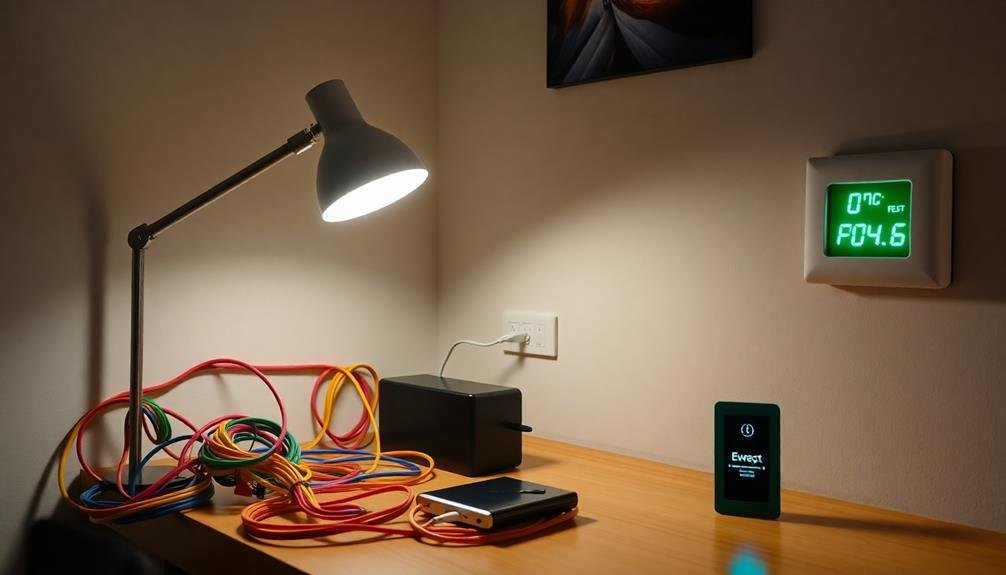

Leave a Reply